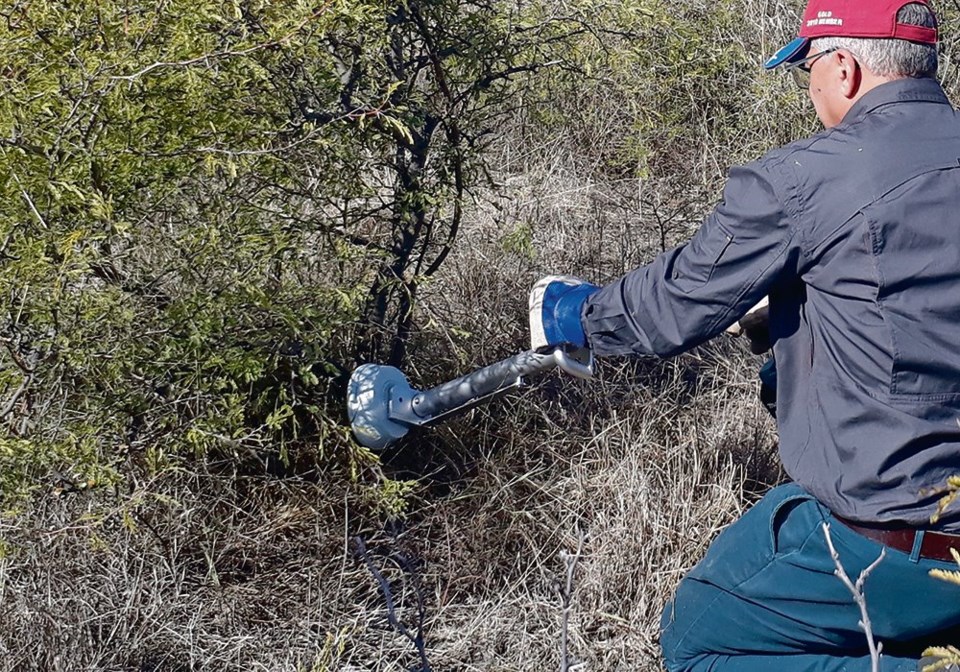WESTERN PRODUCER — Herbicide delivery is normally achieved by spraying, but now researchers at Australia’s University of Queensland have developed a system that uses herbicide-filled capsules drilled into the stems of woody weeds.
The system has proven to be safer, cleaner and just as effective as conventional manual herbicide sprays without the threat of negative health impacts on workers and the surrounding environment.
“Invasive (prickly) woody weeds have been a major issue in Australian rangelands,” said Amelia Limbongan, PhD candidate at the School of Agriculture and Food Sciences.
Limbongan said that the capsule method was effective against a variety of weed species that pose a major threat to farming and grazing systems.
In particular, it has been effective against the invasive mimosa shrub, which is classified as a noxious weed and ranked the 10th most problematic weed in Australia.
Australian farmers spend A$1.76 billion annually to kill problem weeds. But this has often led to herbicide resistance and the fact that the sprayed herbicides fail to kill the seeds of the next generation. Control often requires time-consuming and costly land clearing.
“Not only mimosa bush, but other prickly woody weeds such as prickly acacia, mesquite, and parkinsonia threaten our grazing system and have become a major concern to our natural environment,” said Limbongan. “Our local farmers are interested in whether this system can be used on other woody weeds, such as African boxthorn, Chinese elm and various invasive cacti as they are often found in reasonably inaccessible areas where other control methods are challenging.”
The University of Queensland worked for years on the development of more effective herbicides with a safer and more ethical delivery system.
Plant pathologist Victor Galea and his colleague Naomi Diplock explored the natural influencers of dieback in weed species and looked at harnessing fungi as a natural management method. The research led to the development of the fungal bioherbicide Di-Bak Parkinsonia.
The university founded BioHerbicides Australia, which developed the novel herbicide delivery system and produces the capsules in a production facility there.
The study conducted by Limbongan and her team evaluated the encapsuled delivery system and its effectiveness at minimizing spray drift and non-target damage.
According to Limbongan, the pharmaceutical grade capsules are filled with herbicides in dry formulations that are mostly water dispersible granules. One of the experimental products is in a powdered form.
In the study, capsules were implanted into the stem of intact plants or into the stump of cut plants close to ground level. Trials were run in the state of New South Wales.
According to the researchers’ report, the highest efficacy was achieved on single-stemmed plants. With further refinement of the technique, similar results are possible for multi-stemmed plants.
The portable method uses 30 percent less herbicide to kill woody weeds, saving time and money for farmers and foresters. The custom designed applicator, called an InJecta, consists of a head unit with sharp spikes to lock firmly onto the plant’s surface, an eight millimetre drill bit to bore a hole 25 mm deep, a removable magazine that holds 30 herbicide capsules and sealing plugs, and a body, handle, and shaft to which a cordless drill is attached.
“This device allows the operator to drill a hole, rapidly implant the capsule followed by the plug and the procedure takes between five and eight seconds,” said Limbongan. “The purpose of the plug is to seal the capsule into the plant where the sap from the plant reduces the integrity of the capsule and dissolves the herbicide. The system allows the operator to treat individual plants while protecting surrounding (non-weed) plants from accidental exposure. This is a highly targeted method. Nothing is wasted.”
One capsule is administered for every 10 centimetres of stem circumference and is applied at equal spacing around the stem. The efficiency of the system prevents the risk of spray drift and off-target damage.
Safety glasses and gloves are needed during the injection process but there is minimal need for extensive personal protective equipment.
She said that, for farmers, foresters, and landowners, there are savings in terms of the time shortened treating trees and a higher kill rate resulting in less need for re-treating.
“More importantly, the pricing of the capsule is competitive compared to herbicides used in conventional methods. The convenience factor is significant. Because this system is portable and ready to use without the need to prepare a tank mix, haul a sprayer, cart water, put on personal protective equipment and clean up afterwards, a weed controller can literally take the unit out of the vehicle and treat plants opportunistically.”
Two products are registered and in full production. They are Di-Bak Parkinsonia and Di-Bak G (glyphosate). Several other products are in development and being produced for evaluation and research purposes to help farmers, foresters, and environmental managers.
The delivery system has received a great deal of positive feedback from professional weed control companies, local councils, and the forestry industry.
“There has been great feedback on Di-Bak G in terms of both use and efficacy,” she said. “Glyphosate is a good general-purpose herbicide that works across a wide range of species. It has been particularly effective in the forestry industry where it has been used for thinning out plantations of pine trees and Eucalypts and to control woody weeds in these systems. One commercial (company) reported that the convenience of using lightweight capsules was a great improvement on the usual process of having to wear a 20-litre backpack sprayer and the attendant PPE.”
Researchers next plan to continue to evaluate the products and the methodology across a greater range of woody weeds to determine which products are most efficient while fine-tuning the methodology on a species-by-species basis.
The research was published in the journal Plants.




